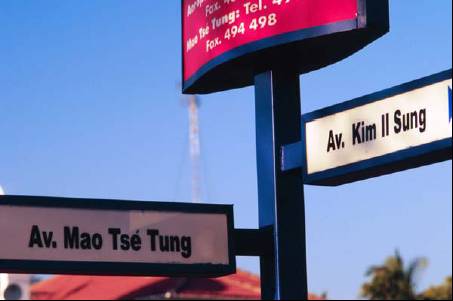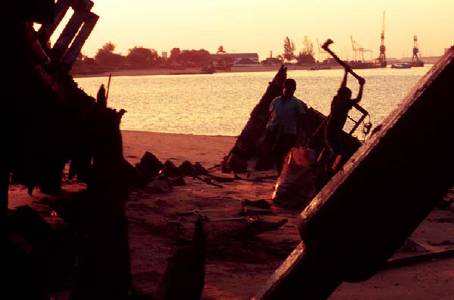 |
 |
 |
|
| home | about jelte | photography | erudition | links | PanAmerican Expedition |
|
Africa's Stolen Revolution: The Story of Moçambique In Ruckus [Vol. 8, Iss. 3, January 2005] and the Washington Spark Moçambique is one of those countries that few Americans will ever hear about, and even less will ever get to visit. From our privileged view atop our victorious post-Cold War balcony - built with the tropical hardwood, and carried upon the broken backs, of our brothers and sisters in the Southern lands - we should steal an occasional glance downwards at that continent so easily overlooked: Africa.
As dreams of Revolution become whispers, and whispers transform slowly into words, and over the coming two decades these words, perhaps, start boiling over into actions, we would do well to reflect on the story of Moçambique’s stolen revolution. A revolution that ultimately failed, but not before catalyzing and inspiring the end of white minority rule throughout much of Africa. The Legacy of Samora Machel Just over 18 years ago, a Russian-made Tupolev
134 aircraft slammed into the Lebomba mountains in South Africa,
near the border with Swaziland and Moçambique. Among the
passengers killed were the Moçambiquan president Samora Machel,
along with most of his entourage. The cause of the accident, which
occurred under highly suspicious circumstances at a time of great
tension between Moçambique and Apartheid South Africa, was
never resolved. Not surprisingly, Moçambiquans and black
South Africans alike pointed the finger of blame squarely at South
Africa’s white Apartheid government. Affectionately known and remembered as “President Samora”, Machel had spearheaded a bloody 10-year revolutionary struggle that eventually led to independence from the Portugese in June 1975. "Of all the things we have done, the most important - the one that history will record as the principal contribution of our generation - is that we understood how to turn the armed struggle into a Revolution; that we realized that it was essential to create a new mentality to build a new society" said Machel. The new Moçambiquan flag donned, amongst a book and a tiller, the icon of an AK-47 rifle – the only flag in the world to do so. The symbol would prove to be as appropriate for Moçambique’s future as it was for its past. Under Machel’s party, FRELIMO (Front for the Liberation of Moçambique), the country became a springboard for tireless armed resistance against the racist white minority regimes in neighboring Rhodesia and South Africa. Even today, the mere mention of Machel’s name almost anywhere in Africa will be greeted with respect and awe. The Rhodesian and South African governments responded with a brutal campaign designed to undermine the very soul of Moçambiquan livelihood through a front called the Mocambiquan National Resistance (RENAMO). Although most textbooks describe the ensuing onslaught as a civil war, it should be pointed out unequivocally that RENAMO was erected, trained and supplied wholly by foreign agents. Atrocities continued with little pause until FRELIMO jettisoned its Marxist ideology in the early 90s.
Moçambique Today Today, Moçambique is one of the poorest countries on the planet. Life expectancy at birth stands at an abysmal 38.5 years. In the capital Maputo, massive abandoned cement skyscrapers pepper the skyline, too rickety to inhabit and too expensive to demolish. Beggars, prostitutes and desperate vendors attempt to carve out a meager existence on streets whose names once inspired a feeling of optimism and hope: “Mao Tse Tung Avenue”, “Karl Marx Street” and “Friedrich Engels Drive”. Almost 80% of Moçambique’s 19 million or so citizens live with less than two dollars a day to spend. Demarcated areas strewn with landmines are a common sight along Moçambique’s only –and barely drivable- national road, as are their one-legged and legless victims. When asked why their country is faring poorly, Moçambiquans almost unanimously invoke government corruption as the primary cause. Even in villages as far as 1000 miles north of Maputo, stories relating the spending sprees of government ministers and their immediate family-members abound. “Our government doesn’t care about us. Corruption is everywhere. It’s a top-down problem.” said Silvinhio, a 26-year old unemployed man living in the coastal village of Vilanculos. His bitterness and anger resonate throughout the country and, indeed, much of the continent.
Moçambique Tomorrow As Moçambique slowly tries to recover from a history of war, and grapples with floods, famine and corruption, it is hard to see how people keep hope. One UN development expert told me: “This country is finished. Things won’t change. Not in fifty, even one hundred years.” Even for journalists intimately familiar with an unfair world, the human capacity to cope, and smile, in the face of overbearing odds never ceases to amaze. But on a planet forever shrinking, there will come a day when it is people’s capacity to forgive, not cope, to which we will find ourselves appealing.
|
|
info@yell2jelte.org
|



